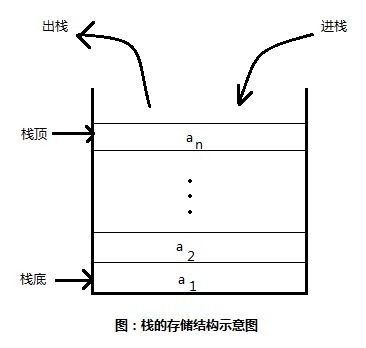上一篇总结完了线性表之链表,这一篇文章我们要总结的是栈,我想从以下几个方面来进行总结。
1,什么是栈?
2,栈的存储结构?
3,栈的常见操作及代码实现?
1,什么是栈
首先栈是一种特殊的线性表。那它的特殊性表现在哪里呢?栈是限定在表的一端进行插入和删除运算的线性表,因此,栈也称为后进先出(LIFO)的线性表。
它有很多应用场景,比如食堂中的一叠盘子,我们只能从顶端一个一个地取。
2,栈的存储结构
实现代码:
/// <summary> /// 封装顺序栈 /// </summary> /// <typeparam name="T"></typeparam> public class SeqStack<T> { //使用数组来存放结点 public T[] data; //栈顶指针 public int top = -1; public SeqStack(int length) { data=new T[length]; } }
3,栈的常见操作及实现代码
1,初始化
实现思路:用指定大小的length实例化一个SeqStack<T>,然后使top指针指向-1。
2,进栈
实现思路:将top指针加1,然后将新结点插入到top指针指向的位置。
3,出栈
实现思路:消灭top指向的结点,并使top指针减1。
4,获取栈顶元素
实现思路:与出栈相似,只是不改变栈的状态而已。
5,判断是否栈空
实现思路:如果top指针是否等于-1,如果是则返为空栈。
6,判断是否栈满
实现思路:检查top指针的值是否等于数组的长度,如果是则为栈满。
C#版代码:
namespace DS.Model { /// <summary> /// 学生实体 /// </summary> public class Student { public int ID { get; set; } public string Name { get; set; } public int Age { get; set; } } } namespace DS.BLL { public class SeqStackBLL { /// <summary> /// 初始化 /// </summary> /// <param name="length"></param> /// <returns></returns> public static SeqStack<T> Init<T>(int length) { SeqStack<T> seqStack = new SeqStack<T>(length); seqStack.top = -1; return seqStack; } /// <summary> /// 进栈 /// </summary> /// <typeparam name="T"></typeparam> /// <param name="seqStack"></param> /// <param name="data"></param> public static void Push<T>(SeqStack<T> seqStack, T data) { //检查是否栈满 if (IsFull(seqStack)) return; seqStack.data[++seqStack.top] = data; } /// <summary> /// 出栈 /// </summary> /// <typeparam name="T"></typeparam> /// <param name="seqStack"></param> public static T Pop<T>(SeqStack<T> seqStack) { //检查是否栈空 if (IsEmpty(seqStack)) return default(T); seqStack.data[seqStack.top]=default(T); return seqStack.data[--seqStack.top]; } /// <summary> /// 获取栈顶元素 /// </summary> /// <typeparam name="T"></typeparam> /// <param name="seqStack"></param> /// <returns></returns> public static T GetTop<T>(SeqStack<T> seqStack) { //检查是否栈空 if (IsEmpty(seqStack)) return default(T); return seqStack.data[seqStack.top]; } /// <summary> /// 获取栈中元素个数 /// </summary> /// <typeparam name="T"></typeparam> /// <param name="seqStack"></param> /// <returns></returns> public static int GetLength<T>(SeqStack<T> seqStack) { return seqStack.top + 1; } /// <summary> /// 判断是否栈满 /// </summary> /// <typeparam name="T"></typeparam> /// <param name="seqStack"></param> /// <returns></returns> private static bool IsFull<T>(SeqStack<T> seqStack) { return seqStack.top == seqStack.data.Length; } /// <summary> /// 判断是否栈空 /// </summary> /// <typeparam name="T"></typeparam> /// <param name="seqStack"></param> /// <returns></returns> private static bool IsEmpty<T>(SeqStack<T> seqStack) { return seqStack.top == -1; } } /// <summary> /// 封装顺序栈 /// </summary> /// <typeparam name="T"></typeparam> public class SeqStack<T> { //使用数组来存放结点 public T[] data; //栈顶指针 public int top = -1; public SeqStack(int length) { data=new T[length]; } } } namespace SeqStack.CSharp { class Program { static void Main(string[] args) { SeqStack<Student> seqStack = null; Console.WriteLine("***********************初始化*****************************\n"); seqStack = SeqStackBLL.Init<Student>(10); if (seqStack != null && seqStack.data.Length > 0) Console.WriteLine("初始化成功\n"); else Console.WriteLine("初始化失败\n"); Console.WriteLine("当前栈中有{0}个元素", SeqStackBLL.GetLength(seqStack)); Console.WriteLine("\n***********************进栈*****************************\n"); Console.WriteLine("压入3条数据\n"); SeqStackBLL.Push<Student>(seqStack, new Student { ID = 1, Name = "a", Age = 10 }); SeqStackBLL.Push<Student>(seqStack, new Student { ID = 2, Name = "b", Age = 11 }); SeqStackBLL.Push<Student>(seqStack, new Student { ID = 3, Name = "c", Age = 12 }); Display(seqStack); Console.WriteLine("\n***********************出栈*****************************\n"); Console.WriteLine("弹出栈顶元素\n"); Student student= SeqStackBLL.Pop<Student>(seqStack); Console.WriteLine("当前栈顶元素为:ID={0},Name={1},Age={2}",student.ID,student.Name,student.Age); Console.WriteLine("\n***********************获取栈顶元素*****************************\n"); Student student1= SeqStackBLL.GetTop(seqStack); Console.WriteLine("当前栈顶元素为:ID={0},Name={1},Age={2}", student1.ID, student1.Name, student1.Age); Console.WriteLine("\n***********************获取栈中元素个数*****************************\n"); Console.WriteLine("当前栈中有{0}个元素\n", SeqStackBLL.GetLength(seqStack)); Console.ReadKey(); } private static void Display(SeqStack<Student> seqStack) { Console.WriteLine("****展示数据****\n"); for (int i = SeqStackBLL.GetLength(seqStack)-1; i>=0; i--) { Console.WriteLine("ID={0},Name={1},Age={2}",seqStack.data[i].ID,seqStack.data[i].Name,seqStack.data[i].Age); } Console.WriteLine("****展示完毕****\n"); } } }
程序运行结果:
C语言版:
#include "stdio.h" #include "stdlib.h" #include "io.h" #include "math.h" #include "time.h" #define OK 1 #define ERROR 0 #define TRUE 1 #define FALSE 0 #define MAXSIZE 10 typedef int Status; typedef int ElemType; /* 顺序栈结构 */ typedef struct { /*使用数组来存放结点*/ ElemType data[MAXSIZE]; /* 栈顶指针 */ int top; }SeqStack; /*初始化*/ /************************************************************************/ /* 思路:使top指针指向-1 */ /************************************************************************/ Status Init(SeqStack *seqStack) { seqStack->top=-1; return OK; } /*进栈*/ /************************************************************************/ /*思路:top指针加1,然后将新结点从栈顶压入 */ /************************************************************************/ Status Push(SeqStack *seqStack,ElemType e) { //检查是否栈满 if (IsFull(seqStack)) return ERROR; seqStack->data[++seqStack->top]=e; } /*出栈*/ /************************************************************************/ /*思路:消灭top指向的结点,并使top指针减1 */ /************************************************************************/ Status Pop(SeqStack *seqStack,ElemType *e) { //检查是否栈空 if (IsEmpty(seqStack)) return ERROR; *e=seqStack->data[seqStack->top]; seqStack->top--; return OK; } /*获取栈顶元素*/ /************************************************************************/ /*思路:用e返回top指针指向的元素的值 */ /************************************************************************/ Status GetTop(SeqStack *seqStack,ElemType *e) { //检查是否栈空 if (IsEmpty(seqStack)) return ERROR; *e=seqStack->data[seqStack->top]; } /*获取栈中元素个数*/ /************************************************************************/ /*思路:取栈的长度即可 */ /************************************************************************/ int GetLength(SeqStack *seqStack) { return seqStack->top+1; } /*判断是否栈空*/ Status IsEmpty(SeqStack *seqStack) { return seqStack->top==-1; } /*判断是否栈满*/ Status IsFull(SeqStack *seqStack) { return seqStack->top==MAXSIZE-1; } /*展示栈中数据*/ void Display(SeqStack *seqStack) { int i; printf("**********开始展示数据**********\n"); for (i=seqStack->top;i>=0;i--) { printf("%d ",seqStack->data[i]); } printf("\n**********展示结束**********\n"); } void main() { SeqStack seqStack; int j; ElemType e; printf("********************初始化********************\n"); if (Init(&seqStack)) printf("初始化成功!\n"); else printf("初始化失败!\n"); printf("\n********************进栈********************\n"); printf("依次插入10个元素\n"); for (j=1;j<=10;j++) { Push(&seqStack,j); } Display(&seqStack); printf("\n********************出栈********************\n"); printf("弹出栈顶元素\n"); Pop(&seqStack,&e); printf("被弹出的栈顶元素是:%d\n",e); printf("\n****************获取栈顶元素****************\n"); GetTop(&seqStack,&e); printf("当前栈顶元素是:%d\n",e); printf("\n****************获取栈中元素个数****************\n"); printf("当前栈中共有%d个元素\n",GetLength(&seqStack)); getchar(); }
程序运行结果:




 浙公网安备 33010602011771号
浙公网安备 33010602011771号